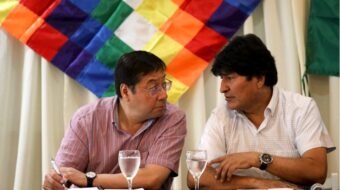Britain: Foreign office concerned re U.S. military trials
British government officials, human rights activists and lawyers for detainees’ families are expressing concern over the situation of two British citizens, detained at Guantanamo as Al Qaeda suspects. They, and Australian David Hicks, are among the six detainees facing possible trial on terrorism charges before U.S. military tribunals.
The Washington Post quoted a British Foreign Office spokesperson, speaking July 4 not for attribution, as saying British officials expressed “serious concerns about the military commission process.
“We have to make clear … that we want the detainees to have a fair trial. There are internationally accepted rules – such as the presumption of innocence, access to evidence and access to lawyers and an appeals process – and we’ll be looking to discuss these aspects with the United States.”
Human rights activists, and lawyers retained by the detainees’ parents, are also objecting to the prospect of secret trials, with military lawyers defending the suspects, and a possible death penalty.
Colombia: Court orders fumigation suspended
A Colombian court ruled June 26 that the government should suspend its U.S.-sponsored program to spray herbicides on drug crops until more is known about the effects on human health and the environment, the BBC reported.
The ruling was in response to a lawsuit filed by lawyer Claudia Sampedro, who said she was pleased the decision recognized the Colombian people’s right to a “clean environment.”
“These policies were drawn up without first studying effects on health and the environment,” said Sampedro, chosen to represent environmentalists, human rights activists and small farmers staunchly opposed to the fumigation program.
The Colombian government and U.S. officials claim the chemical used – a cousin of “Roundup” – is safe for people and the environment. The government disagrees with the court’s ruling, and will continue fumigating, pending the outcome of its appeal.
Nigeria: General strike continues
Nigeria’s general strike went into its second week, after the national union federation rejected a compromise offered by the government. The strike started June 30 to protest a fuel price hike of over 50 percent, with the Nigeria Labor Congress demanding the price increase be completely rescinded. The NLC rejected the government’s offer to limit the increase to 35 percent.
NLC President Adams Oshiomhole said he would communicate directly with President Olusegun Obasanjo concerning the federation’s decision to continue the strike. He also complained of brutal police tactics after police fired teargas at strikers during the first days of the work stoppage.
Resentment is high among Nigerians over the fuel price hike, which has sent their real incomes plummeting.
United Nations: Workers protest suspension of union
The UN’s shutting down of its Staff Union has aroused the anger and resentment of thousands of its workers.
On June 27, top UN officials told union leaders that effective June 30, workers at UN headquarters in New York would no longer be entitled to their representation until further notice.
UN officials claimed union leaders had not held new elections on time, but union leaders said the administration foiled their efforts by introducing controversy over procedure.
Staff union vice president Guy Candusso told UN employees that such an action “had never happened before in the history of the union.” Union president Rosemary Waters said the UN “is intent on denying its staff their basic human rights to due process.”
The Staff Union represents some 5,000 workers, over half of whom are employed on short term contracts. Many workers believe the union was shut down because it was pressing issues including workplace discrimination, inequalities in the income tax reimbursement system and lack of appropriate child care facilities.
Pakistan: Sugar workers uphold union rights
The international food and agriculture workers federation IUF said this week that the newly-founded Pakistan Sugar Mill Workers’ Federation has won an important victory against union busting. The Federation was founded in mid-May with IUF support, to prepare for a united organizing and bargaining front of sugar workers facing overcapacity, restructuring and repression.
Soon thereafter, the Army Welfare Sugar Mill in Badin, Sindh province, told federation head Abdus Salam Memon that the plant union he also heads was being dissolved. The stated reason: the mill was the only Army Welfare Trust enterprise to have a union. Management then ordered the union, in existence since the plant opened in 1983, to close at once, threatening force if the union didn’t comply.
The union responded with a vigorous campaign including international support, rallies and demonstrations and a June 23 limited hunger strike.
On June 26, management recognized the union, which now has full access to its office in the factory and can meet as needed.
International notes are compiled by Marilyn Bechtel,
international secretary of the Communist Party.
She can be reached at cpusainternat@mindspring.com









